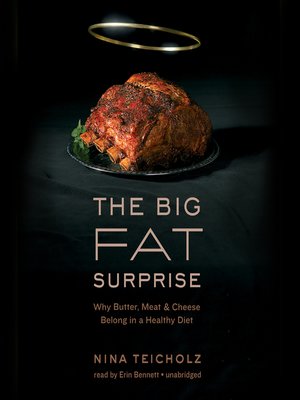
It’s been a pretty amazing few weeks for news about healthy eating. First was the publication of The Big Fat Surprise – Why Butter, Meat and Cheese Belong in a Healthy Diet. Next was our chance to talk to Big Fat Surprise author Nina Teicholz by phone. And now the release of the National Institutes of Health study.
“People who avoid carbohydrates and eat more fat, even saturated fat, lose more body fat and have
lower risk for heart disease than people who follow the low-fat diet that health authorities have favored for decades.”
We told Nina Teicholz how glad we were to see her book, that it felt like we’ve been talking about healthy fats and a whole foods diet for years, and that we finally had a book with all the evidence needed to back up what we’ve been saying all along.
We knew our instincts about nutrition were right, we heard this stuff here and there over the years. One study a few years ago from Newcastle University in England on why grass-fed milk was more nutritious, another study last year from the Organic Institute showing that organic foods provide better nutrition primarily because of the micronutrients in food that’s grown in healthy soil. Then there’s all the evidence that organic food production is better for the environment. But here in the Big Fat Surprise is all the information you need to convince yourself or anyone else that everything you’ve heard about dietary fat and cholesterol for the past two generations has been proven wrong.
Which dietary myth do you want to disprove? There’s 70 years worth of bad, counter-productive, even deadly advice shot full of holes:
- Myth #1: Lean meat is best. Cut the fat and skin off those chicken breasts, eat only lean beef? Wrong. We do better when we eat a fat:protein ration of about 2:1.
- Myth #2: Saturated fat is bad. Not true, but Ancel Keys, the researcher who generated the most information on cholesterol and fat in the mid-20th century had such a strong hold on the scientific community that he was able to bully into silence anyone who questioned his research or methods.
- Myth #3: Vegetable oil is better. Nope. In 1971 the (food-industry funded) National Institutes of Health created a $250 million study designed to show the benefits of eating refined oils like Mazola corn oil. Instead of showing what the funders wanted, this massive study found that test subjects who ate the test diet died at higher rates than control subjects. NIH response? “I don’t know. Troublesome. Unexpected. Not explained.” Did it change anything at the American Heart Association or the USDA? Nope, they disregarded the negative findings.
- Myth #4: Nutritional studies must rigorously adhere to scientific methods and ethics. Wrong. A 20-year study on 2000 men who worked at Western Electric near Chicago, IL found that the “amount of saturated fatty acids in the diet was not significantly associated with risk of death from coronary heart disease.” In discussing the findings the authors dismissed their own data and shifted to studies that had the “correct” outcome.
We asked Nina how she thought readers would receive her message. She said, “People are ready for this change.” We’ve already seen it – sales of our Kalona SuperNatural™ products are growing every year. Butter consumption is way up (hello June 12, 2014 Time magazine cover!) in the wake of a ten-year shift toward locally-produced, healthier foods. Farm-to-table eating has led to snout-to-tail eating, and recognition of the need to utilize all of an animal. Locavores understand that to embrace truly sustainable eating you have to eat the ham hocks, the fattier cuts, even more and more butchers’ cuts that our grandparents ate, that we’ve shied away from until recently – organ meats, hearts, livers.
America’s problem with obesity and diabetes? It’s probably not from eating meat, butter and cheese. It’s hard to overeat on full fat foods – fat delivers satiety. When you eat too many complex carbohydrates and sugar you’re constantly hungry, and reach for more.
If you’re still reading and you want one more fascinating voyage into nutritional research on dietary fat, Nina mentioned the University of Cambridge study released in March, 2014, too late to be included in her book, that found “there’s insufficient evidence to support the long-standing recommendation to consume saturated fat in very low amounts.”
Still not enough evidence that everything you’ve heard for the past 70 years about fat has been wrong? How about this from a recent NPR article? “A prior analysis that included more than 300,000 participants came to a similar conclusion.” What conclusion? A “null association” – no connection – between total saturated fat intake and coronary risk.”
Ready to read? You can find information on how to order or find The Big Fat Surprise – Why Butter, Meat & Cheese Belong in a Health Diet. You can also watch this Ted Talks video with Nina to learn more.
So go ahead and pour yourself a big glass of Kalona SuperNatural™ organic whole milk, sit back, and find out everything that’s right about eating fat again.
